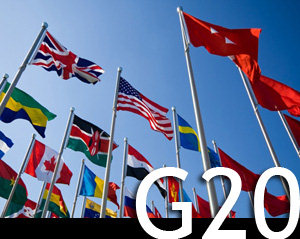G20 moves a few steps closer to taming financial sector
 Pittsburgh, Pennsylvania - With the global economy edging toward recovery after the worst financial crisis in seven decades, the world's 20 leading economic powers used their latest summit to show they were determined not to repeat the mistakes of the past.
Pittsburgh, Pennsylvania - With the global economy edging toward recovery after the worst financial crisis in seven decades, the world's 20 leading economic powers used their latest summit to show they were determined not to repeat the mistakes of the past.
The third Group of 20 (G20) summit since November was again hosted by the country that started it all, but this time in a city that serves as an example of how to turn things around.
The near-collapse of the US financial sector on Wall Street in September 2008 helped nudge the wider world into its first recession since World War II. Unemployment has surged in wealthy countries, while 90 million more people have been nudged into extreme poverty.
To bring home the point that this summit was about change, President Barack Obama picked Pittsburgh, Pennsylvania, as a meeting place. Long known as the rusting heart of the steel industry, Pittsburgh has reinvented itself by shifting focus from metals to the burgeoning technology, finance and health-care sectors.
World leaders are hoping to encourage a similar turnaround in the global economy. German Chancellor Angela Merkel said the agreements hammered out by the G20 in Pittsburgh should give people confidence that "such a crisis will never happen again."
Much of their final communique is dedicated to spurring more "balanced growth" in the future by increasing international coordination. The G20 pledged to set up a framework that would allow them to keep closer tabs on each other's economic policies.
The idea is to catch imbalances before they get out of hand, representing something of a victory for the United States. US officials partly blame the current crisis on China's propensity to save, which fueled the United States' long-time culture of spending.
"We will work together to ensure that our fiscal, monetary, trade and structural policies are collectively consistent with more sustainable and balanced trajectories of growth," the G20 said in its final statement.
Leaders agreed to a series of financial reforms that aim to curb excessive risk taking by banks. There is a plan for international standards that would make executive pay more dependent on performance. Governments also aimed to raise the amount of capital that banks have to hold, shoring up their stability and resilience against losses.
"Never again should we let the schemes of a reckless few put the world's financial system - and our people's well-being - at risk," Obama said in a press conference summing up the day's discussions.
The G20 leaders, especially the United States, have been coming under increasing pressure to show they are serious about reforming the financial system.
There was some discord ahead of the summit. The European Union pushed for caps on bank executive bonuses and insisted that the G20 develop an "exit strategy" to pull back massive public spending efforts as the economy recovers. The United States and China have been more eager to keep their stimulus measures in place.
The differences were largely papered over by the end of the day. There were no caps on bonuses, but the EU did win a promise of penalties for banks that don't follow the stiffer government standards on salaries.
There was a promise to keep stimulus measures in place "until a durable recovery is secured," alongside a concession that clearer exit strategies should be developed in the coming months. (dpa)